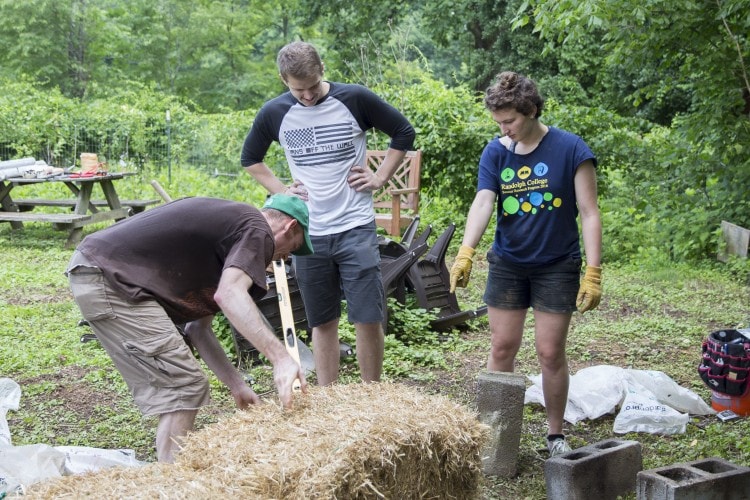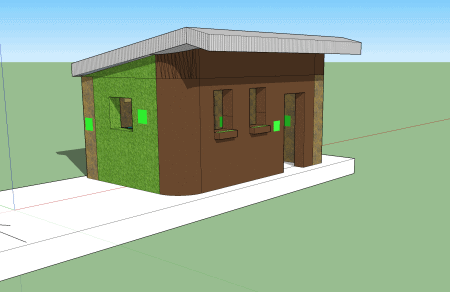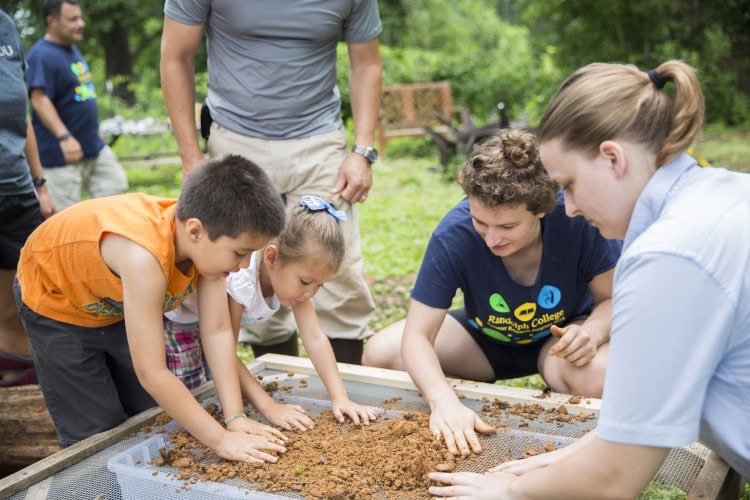Tiny house project building momentum

Jessy Spencer ’18 oversees the construction of a straw bale bench made at a workshop last week.
Tiny houses were a big topic of discussion at Randolph last year, thanks to a project that researched the ins and outs of constructing one on campus. This summer, Jessy Spencer ’18 is building off that momentum—literally.
Spencer is working on a Summer Research project with Karin Warren, the Herzog Family Chair of Environmental Studies, to develop comprehensive construction plans for an educational model of a tiny house near Randolph’s Organic Garden. The rectangular-shaped model will contain informational signage and be made from cob and straw bale—both sustainable and eco-friendly materials.

A digital sketch of the tiny house model
“The thing we like about this design is it gives students more opportunities to learn about natural-building construction,” Warren said. “The cob is particularly nice because you can be really creative in design internally and externally. For example, you could have flower trenches on the outside that retract into shelving on the inside.”
Spencer is also sharing what she learns with the community. She has documented her progress in weekly blog posts and is coordinating workshops to teach others about the benefits and construction methods for building tiny houses. Last week, she hosted a straw bale workshop with Adam Eller ’13, an environmental specialist for the Department of Environmental Quality, and plans to host a cob workshop in the fall.
Warren has been impressed by Spencer’s initiative and time-management skills.
“I think organization and learning how to appropriately document your work are extra skills you get out of Summer Research,” Warren said. “It’s not just doing the project—there’s project management and scheduling. I think what Jessy’s discovered is it can get overwhelming, but it’s about taking a huge project and breaking it up into smaller, more manageable tasks.”
Also supporting Spencer is Randolph sustainability coordinator Sara Woodward ’16, who started the original project with Hagay Haut ’16 as a student last year. Spencer was intrigued by their work.
“Sara and Hagay invited me to their straw bale workshops and the tiny house workshop, and it was just a lot of fun,” Spencer said. “They needed some extra people to help, and I fell in love with it.”
Spencer sees tiny houses as an environmentally sustainable housing solution—as well as a way to reduce clutter. “If you have less things, it requires you to go out more,” she said. “If you don’t own a lot of books, you have to go to the library. If you don’t have air conditioning when it’s really hot, you have to go somewhere cool and socialize. It forces you to become more social in a good way.”
Though Summer Research and the planning phase is nearing completion, Warren said more student-run projects are on the horizon. “It’s going to take years to see this come to fruition, and we knew this was a three- to five-year project going in,” Warren said. “But the work we’re doing and the details we’re gathering this summer for continuing the project are essential.”

Jessy Spencer ’18 and sustainability coordinator Sara Woodward ’16 filter clay with children at the straw bale workshop in Randolph’s Organic Garden last week.

